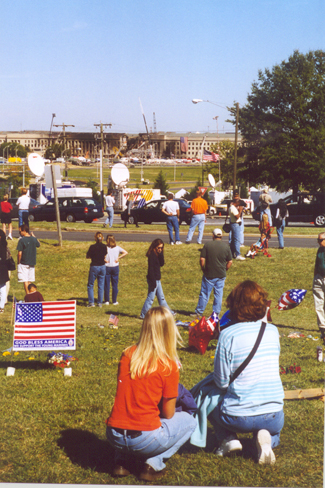Dan Button remembers walking quickly to work at the Defense Intelligence Agency (DIA) in Washington D.C. Tuesday, Sept. 11, 2001.
Instinct caused him to look down the street, toward the Ronald Reagan Washington National Airport. He said he wanted to see if there were still airplanes in the air.
Past the airport, he saw the Pentagon. Then, he saw the mushroom cloud. A plane had struck the Pentagon.
He said he started to jog toward the front entrance to the DIA where people, mostly civilian, were streaming out of the doors, Button said. To this day, Button, who serves as director of Veteran Affairs at UI, said he doesn”t know if those people were ordered out or if they were evacuating.

Button entered the building, went to his office where he usually worked and called a Marine in the current operations department to see if they needed volunteers to help.
“I wasn”t unique in that respect,” Button said. “A military person”s instincts are to stay and try to help in any way we could.”
Military personnel had to be ordered away because their instincts were to run toward the fire to help save people, which is similar to how the first responders had to act at the World Trade Center and at the Pentagon on 9/11, Button said.
“None of us will ever take for granted the work all of our first responders do and their sacrifice,” Button said. “They run toward danger to help the rest of us.”

Dan Button | Courtesy
Dan Button”s wife Cindy, right, and daughter Rebecca, left, look at the Pentagon crash site the Saturday after 9/11. Button worked in Washington D.C. during the attack.
He said the roads were clogged with people and cars just around the DIA where he worked. He had called his wife Cindy to tell her he was OK. Cindy then passed the information along to their two daughters Becky, a senior in high school at the time, and Marianne, a student at the University of Idaho. Button spent the rest of the day, until 10 p.m., in his office watching the news coverage.
“I spent the rest of the day feeling helpless, and, like most Americans, angry,” Button said.
Button, a retired Marine, was a Lieutenant Colonel at the time of the attack. He worked as an intelligence officer and was the Marine faculty member of the National Intelligence University.
After 9/11, Button volunteered to go to North Carolina, where he spent the last six months of his career, to be the intelligence officer in charge for an anti-terrorism brigade newly formed in response to the attack.
He was part of the group that sent Marines to the American embassy in Kabul, Afghanistan, for Operation Enduring Freedom. Button did not go personally, but sent a dozen Marines with different intelligence specialties.
Button said UI”s Dads” Weekend was less than two weeks after the attack. Prior to 9/11, he had made a commitment to his daughter Marianne to be there. He said people must have still been uncomfortable flying because he was one of three passengers on the plane from Washington, D.C., to Spokane.
“I still wanted to come out,” Button said. “I wanted to be able to hug my daughter.”
Button”s daughter, a Delta Delta Delta member, told her sorority sisters that he was there and asked him to speak to them. Button said the evening he arrived the sisters gathered in their living room and he told them what had happened.
“I wanted to assure them that their government was working hard to figure out what happened,” Button said.
After 14 years, Button still gets emotional talking about the events of the 2001 attack.
Button said Sept. 11, 2001 was this generation”s Pearl Harbor, Kennedy assassination or the day man walked on the moon. It was one of the defining moments of a generation.
Button will be in Lewiston Friday for a 9/11 memorial.
“It”s important to not forget,” Button said. “And even take a pause during the day for those we lost. To pay tribute to our first responders.”
Claire Whitley can be reached at [email protected] or on Twitter @Cewhitley24